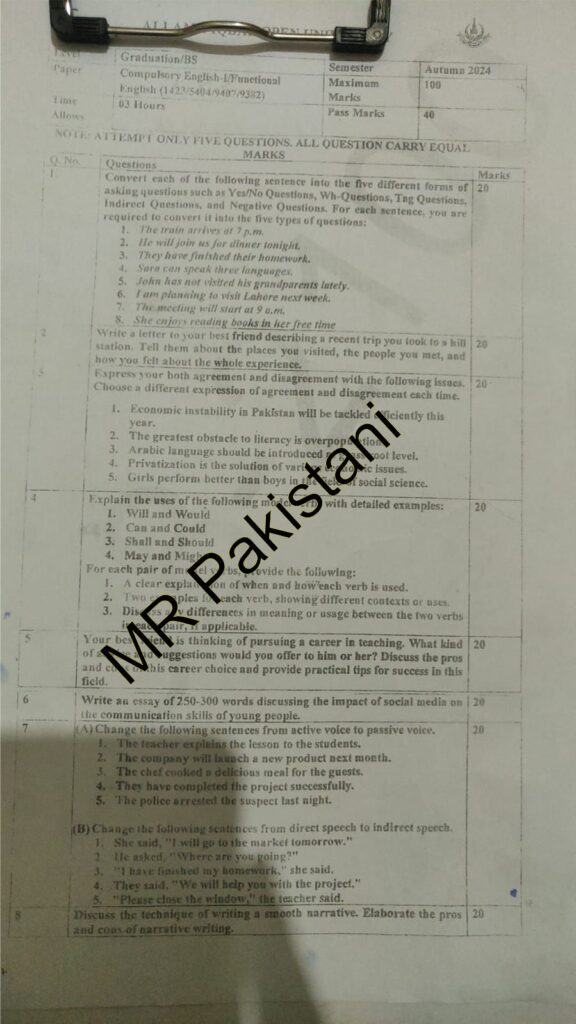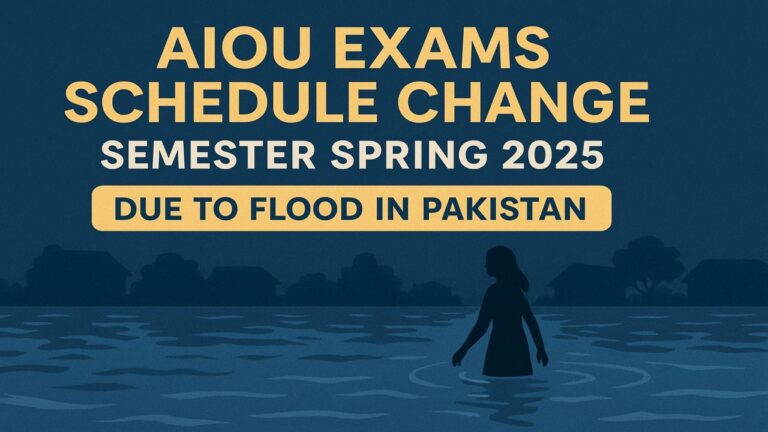1423 Code Solved Paper Autumn 2024 – English-I
The 1423 Code Solved Paper Autumn 2024 is a valuable academic resource for AIOU BA/BS students enrolled in the Compulsory English-I course. This solved paper provides well-organized and comprehensive answers that align with the Autumn 2024 exam pattern, helping students grasp essential language concepts and prepare efficiently. It emphasizes grammar, vocabulary building, and reading comprehension through clear, practical examples. For easy access to this solved paper and additional educational resources, visit mrpakistani.com and explore detailed video explanations on our YouTube channel Asif Brain Academy
| Level | BA/BS |
|---|---|
| Semester | Autumn 2024 |
| Subject/Course Code | Compulsory English-I (1423) |
| Maximum Marks | 100 |
| Pass Marks | 40 |
| Medium of Instruction | Compulsory English I |
| ATTEMPT Only Five QUESTIONS | |
1423 Code English-I Past Paper Autumn 2024

1423 Code English-I Solved Paper Autumn 2024
Question 1:
Convert each of the following sentences into the five different forms of asking questions such as Yes/No Questions, Wh-Questions, Tag Questions, Indirect Questions, and Negative Questions. For each sentence, you are required to convert it into the five types of questions:
Convert each of the following sentences into the five different forms of asking questions such as Yes/No Questions, Wh-Questions, Tag Questions, Indirect Questions, and Negative Questions. For each sentence, you are required to convert it into the five types of questions:
- The train arrives at 7 p.m.
- He will join us for dinner tonight.
- They have finished their homework.
- Sara can speak three languages.
- John has not visited his grandparents lately.
- I am planning to visit Lahore next week.
- The meeting will start at 9 a.m.
- She enjoys reading books in her free time.
Answer:
1. The train arrives at 7 p.m.
– Yes/No Question: Does the train arrive at 7 p.m.?
– Wh-Question: What time does the train arrive?
– Tag Question: The train arrives at 7 p.m., doesn’t it?
– Indirect Question: Can you tell me what time the train arrives?
– Negative Question: Doesn’t the train arrive at 7 p.m.?
2. He will join us for dinner tonight.
– Yes/No Question: Will he join us for dinner tonight?
– Wh-Question: When will he join us for dinner?
– Tag Question: He will join us for dinner tonight, won’t he?
– Indirect Question: Do you know if he will join us for dinner tonight?
– Negative Question: Won’t he join us for dinner tonight?
3. They have finished their homework.
– Yes/No Question: Have they finished their homework?
– Wh-Question: What have they finished?
– Tag Question: They have finished their homework, haven’t they?
– Indirect Question: Can you tell me whether they have finished their homework?
– Negative Question: Haven’t they finished their homework?
4. Sara can speak three languages.
– Yes/No Question: Can Sara speak three languages?
– Wh-Question: How many languages can Sara speak?
– Tag Question: Sara can speak three languages, can’t she?
– Indirect Question: Do you know how many languages Sara can speak?
– Negative Question: Can’t Sara speak three languages?
5. John has not visited his grandparents lately.
– Yes/No Question: Has John not visited his grandparents lately?
– Wh-Question: Who has John not visited lately?
– Tag Question: John has not visited his grandparents lately, has he?
– Indirect Question: Do you know if John has visited his grandparents lately?
– Negative Question: Hasn’t John visited his grandparents lately?
6. I am planning to visit Lahore next week.
– Yes/No Question: Am I planning to visit Lahore next week?
– Wh-Question: Where am I planning to visit next week?
– Tag Question: I am planning to visit Lahore next week, aren’t I?
– Indirect Question: Can you tell me if I am planning to visit Lahore next week?
– Negative Question: Am I not planning to visit Lahore next week?
7. The meeting will start at 9 a.m.
– Yes/No Question: Will the meeting start at 9 a.m.?
– Wh-Question: What time will the meeting start?
– Tag Question: The meeting will start at 9 a.m., won’t it?
– Indirect Question: Could you tell me what time the meeting will start?
– Negative Question: Won’t the meeting start at 9 a.m.?
8. She enjoys reading books in her free time.
– Yes/No Question: Does she enjoy reading books in her free time?
– Wh-Question: What does she enjoy doing in her free time?
– Tag Question: She enjoys reading books in her free time, doesn’t she?
– Indirect Question: Do you know what she enjoys doing in her free time?
– Negative Question: Doesn’t she enjoy reading books in her free time?
1. The train arrives at 7 p.m.
– Yes/No Question: Does the train arrive at 7 p.m.?
– Wh-Question: What time does the train arrive?
– Tag Question: The train arrives at 7 p.m., doesn’t it?
– Indirect Question: Can you tell me what time the train arrives?
– Negative Question: Doesn’t the train arrive at 7 p.m.?
2. He will join us for dinner tonight.
– Yes/No Question: Will he join us for dinner tonight?
– Wh-Question: When will he join us for dinner?
– Tag Question: He will join us for dinner tonight, won’t he?
– Indirect Question: Do you know if he will join us for dinner tonight?
– Negative Question: Won’t he join us for dinner tonight?
3. They have finished their homework.
– Yes/No Question: Have they finished their homework?
– Wh-Question: What have they finished?
– Tag Question: They have finished their homework, haven’t they?
– Indirect Question: Can you tell me whether they have finished their homework?
– Negative Question: Haven’t they finished their homework?
4. Sara can speak three languages.
– Yes/No Question: Can Sara speak three languages?
– Wh-Question: How many languages can Sara speak?
– Tag Question: Sara can speak three languages, can’t she?
– Indirect Question: Do you know how many languages Sara can speak?
– Negative Question: Can’t Sara speak three languages?
5. John has not visited his grandparents lately.
– Yes/No Question: Has John not visited his grandparents lately?
– Wh-Question: Who has John not visited lately?
– Tag Question: John has not visited his grandparents lately, has he?
– Indirect Question: Do you know if John has visited his grandparents lately?
– Negative Question: Hasn’t John visited his grandparents lately?
6. I am planning to visit Lahore next week.
– Yes/No Question: Am I planning to visit Lahore next week?
– Wh-Question: Where am I planning to visit next week?
– Tag Question: I am planning to visit Lahore next week, aren’t I?
– Indirect Question: Can you tell me if I am planning to visit Lahore next week?
– Negative Question: Am I not planning to visit Lahore next week?
7. The meeting will start at 9 a.m.
– Yes/No Question: Will the meeting start at 9 a.m.?
– Wh-Question: What time will the meeting start?
– Tag Question: The meeting will start at 9 a.m., won’t it?
– Indirect Question: Could you tell me what time the meeting will start?
– Negative Question: Won’t the meeting start at 9 a.m.?
8. She enjoys reading books in her free time.
– Yes/No Question: Does she enjoy reading books in her free time?
– Wh-Question: What does she enjoy doing in her free time?
– Tag Question: She enjoys reading books in her free time, doesn’t she?
– Indirect Question: Do you know what she enjoys doing in her free time?
– Negative Question: Doesn’t she enjoy reading books in her free time?
Question 2:
Write a letter to your best friend describing a recent trip you took to a hill station. Tell them about the places you visited, the people you met, and how you felt about the whole experience.
Write a letter to your best friend describing a recent trip you took to a hill station. Tell them about the places you visited, the people you met, and how you felt about the whole experience.
Answer:
Dear [Friend’s Name],
I hope this letter finds you in great health and high spirits. I just returned from an amazing trip to Murree, and I couldn’t wait to share my experience with you! It was one of the most refreshing and memorable vacations I’ve ever had.
The journey began early in the morning, and as we climbed higher into the hills, the air became cooler and fresher. Our first stop was Patriata (New Murree), where we enjoyed the cable car and chairlift rides. The view from the top was breathtaking — lush green mountains covered in mist and a peaceful silence that made everything feel magical.
During our stay, we also visited Mall Road, Kashmir Point, and Pindi Point. Each location had its own charm. Mall Road was buzzing with people, shops, and the delicious aroma of local snacks. Kashmir Point offered a more serene experience, with stunning views of snow-capped peaks in the distance.
I met some wonderful people along the way, especially the locals who were incredibly hospitable and friendly. We also made friends with a few fellow tourists who were staying at the same hotel. We shared meals, went sightseeing together, and even played card games by the fireplace at night.
Overall, the trip was a much-needed escape from the routine. I felt so calm and connected to nature. The scenic beauty, fresh mountain air, and simple pleasures made me appreciate life more deeply.
I really wish you had been there with me — it would have been even more fun! Let’s plan a trip together soon. I would love to revisit those beautiful places with you.
Take care and write back soon.
With lots of love,
[Your Name]
Dear [Friend’s Name],
I hope this letter finds you in great health and high spirits. I just returned from an amazing trip to Murree, and I couldn’t wait to share my experience with you! It was one of the most refreshing and memorable vacations I’ve ever had.
The journey began early in the morning, and as we climbed higher into the hills, the air became cooler and fresher. Our first stop was Patriata (New Murree), where we enjoyed the cable car and chairlift rides. The view from the top was breathtaking — lush green mountains covered in mist and a peaceful silence that made everything feel magical.
During our stay, we also visited Mall Road, Kashmir Point, and Pindi Point. Each location had its own charm. Mall Road was buzzing with people, shops, and the delicious aroma of local snacks. Kashmir Point offered a more serene experience, with stunning views of snow-capped peaks in the distance.
I met some wonderful people along the way, especially the locals who were incredibly hospitable and friendly. We also made friends with a few fellow tourists who were staying at the same hotel. We shared meals, went sightseeing together, and even played card games by the fireplace at night.
Overall, the trip was a much-needed escape from the routine. I felt so calm and connected to nature. The scenic beauty, fresh mountain air, and simple pleasures made me appreciate life more deeply.
I really wish you had been there with me — it would have been even more fun! Let’s plan a trip together soon. I would love to revisit those beautiful places with you.
Take care and write back soon.
With lots of love,
[Your Name]
Question 3:
Express your both agreement and disagreement with the following issues.
Choose a different expression of agreement and disagreement each time.
1. Economic instability in Pakistan will be tackled efficiently this year.
2. The greatest obstacle to literacy is overpopulation.
3. Arabic language should be introduced at grass root level.
4. Privatization is the solution of various economic issues.
5. Girls perform better than boys in the field of social science.
Express your both agreement and disagreement with the following issues.
Choose a different expression of agreement and disagreement each time.
1. Economic instability in Pakistan will be tackled efficiently this year.
2. The greatest obstacle to literacy is overpopulation.
3. Arabic language should be introduced at grass root level.
4. Privatization is the solution of various economic issues.
5. Girls perform better than boys in the field of social science.
Answer:
1. Economic instability in Pakistan will be tackled efficiently this year.
Agreement: I completely agree with this statement because the current policies show promising results.
Disagreement: I’m afraid I don’t see it that way; the structural issues may take longer to resolve.
2. The greatest obstacle to literacy is overpopulation.
Agreement: That’s exactly how I see it — a large population does strain educational resources.
Disagreement: I beg to differ; I believe poverty and lack of access to schools are bigger barriers.
3. Arabic language should be introduced at grass root level.
Agreement: I couldn’t agree more — it can strengthen cultural and religious understanding from an early age.
Disagreement: I see your point, but I don’t think it’s necessary at the foundational level in our diverse linguistic context.
4. Privatization is the solution of various economic issues.
Agreement: Absolutely! Privatization can bring efficiency and accountability to many sectors.
Disagreement: I respectfully disagree — it may also widen the gap between rich and poor if not regulated.
5. Girls perform better than boys in the field of social science.
Agreement: That’s true to a great extent — studies and results often support this trend.
Disagreement: I’m not so sure about that; performance depends more on interest and dedication than gender.
1. Economic instability in Pakistan will be tackled efficiently this year.
Agreement: I completely agree with this statement because the current policies show promising results.
Disagreement: I’m afraid I don’t see it that way; the structural issues may take longer to resolve.
2. The greatest obstacle to literacy is overpopulation.
Agreement: That’s exactly how I see it — a large population does strain educational resources.
Disagreement: I beg to differ; I believe poverty and lack of access to schools are bigger barriers.
3. Arabic language should be introduced at grass root level.
Agreement: I couldn’t agree more — it can strengthen cultural and religious understanding from an early age.
Disagreement: I see your point, but I don’t think it’s necessary at the foundational level in our diverse linguistic context.
4. Privatization is the solution of various economic issues.
Agreement: Absolutely! Privatization can bring efficiency and accountability to many sectors.
Disagreement: I respectfully disagree — it may also widen the gap between rich and poor if not regulated.
5. Girls perform better than boys in the field of social science.
Agreement: That’s true to a great extent — studies and results often support this trend.
Disagreement: I’m not so sure about that; performance depends more on interest and dedication than gender.
Question 4:
Explain the uses of the following modal verbs with detailed examples:
Explain the uses of the following modal verbs with detailed examples:
- Will and Would
- Can and Could
- Shall and Should
- May and Might
For each pair of modal verbs, provide the following:
- A clear explanation of when and how each verb is used.
- Two examples for each verb, showing different contexts or uses.
- Discuss any differences in meaning or usage between the two verbs in each pair, if applicable.
Answer:
1. Will and Would
Explanation: “Will” is used to express future actions or strong intentions. “Would” is the past tense of “will” and is used for hypothetical situations, polite requests, or habitual actions in the past.
Examples:
Will: I will call you tomorrow. (Future action)
Will: She will finish the report by 5 p.m. (Intention/promise)
Would: I would travel the world if I had money. (Hypothetical)
Would: He would visit his grandmother every Sunday. (Past habit)
Difference: “Will” talks about definite future; “Would” is more polite, uncertain, or hypothetical.
2. Can and Could
Explanation: “Can” is used for ability, permission, and possibility in the present. “Could” is used as the past form of “can”, and also for polite requests or possibilities.
Examples:
Can: She can drive a car. (Present ability)
Can: Can I use your phone? (Permission)
Could: I could swim when I was five. (Past ability)
Could: Could you help me with this? (Polite request)
Difference: “Can” is stronger and more immediate; “Could” is softer and more formal or past-related.
3. Shall and Should
Explanation: “Shall” is used for formal offers or future actions (mainly in British English). “Should” is used to give advice, express obligation, or suggest something is a good idea.
Examples:
Shall: Shall we go for a walk? (Offer/suggestion)
Shall: You shall receive your parcel tomorrow. (Formal future)
Should: You should study for the exam. (Advice)
Should: He should be home by now. (Expectation)
Difference: “Shall” is formal and mostly used for offers/promises; “Should” is for recommendations and obligations.
4. May and Might
Explanation: “May” is used to express permission or possibility. “Might” is used for less certain possibilities or polite suggestions.
Examples:
May: You may leave the class now. (Permission)
May: It may rain this evening. (Possibility)
Might: I might go to the party if I finish my work. (Uncertain possibility)
Might: You might want to check that email again. (Suggestion)
Difference: “May” expresses higher possibility or formality; “Might” suggests lower probability or subtlety.
1. Will and Would
Explanation: “Will” is used to express future actions or strong intentions. “Would” is the past tense of “will” and is used for hypothetical situations, polite requests, or habitual actions in the past.
Examples:
Will: I will call you tomorrow. (Future action)
Will: She will finish the report by 5 p.m. (Intention/promise)
Would: I would travel the world if I had money. (Hypothetical)
Would: He would visit his grandmother every Sunday. (Past habit)
Difference: “Will” talks about definite future; “Would” is more polite, uncertain, or hypothetical.
2. Can and Could
Explanation: “Can” is used for ability, permission, and possibility in the present. “Could” is used as the past form of “can”, and also for polite requests or possibilities.
Examples:
Can: She can drive a car. (Present ability)
Can: Can I use your phone? (Permission)
Could: I could swim when I was five. (Past ability)
Could: Could you help me with this? (Polite request)
Difference: “Can” is stronger and more immediate; “Could” is softer and more formal or past-related.
3. Shall and Should
Explanation: “Shall” is used for formal offers or future actions (mainly in British English). “Should” is used to give advice, express obligation, or suggest something is a good idea.
Examples:
Shall: Shall we go for a walk? (Offer/suggestion)
Shall: You shall receive your parcel tomorrow. (Formal future)
Should: You should study for the exam. (Advice)
Should: He should be home by now. (Expectation)
Difference: “Shall” is formal and mostly used for offers/promises; “Should” is for recommendations and obligations.
4. May and Might
Explanation: “May” is used to express permission or possibility. “Might” is used for less certain possibilities or polite suggestions.
Examples:
May: You may leave the class now. (Permission)
May: It may rain this evening. (Possibility)
Might: I might go to the party if I finish my work. (Uncertain possibility)
Might: You might want to check that email again. (Suggestion)
Difference: “May” expresses higher possibility or formality; “Might” suggests lower probability or subtlety.
Question 5:
Your best friend is thinking of pursuing a career in teaching. What kind of advice and suggestions would you offer to him or her? Discuss the pros and cons of this career choice and provide practical tips for success in this field.
Your best friend is thinking of pursuing a career in teaching. What kind of advice and suggestions would you offer to him or her? Discuss the pros and cons of this career choice and provide practical tips for success in this field.
Answer:
Dear Friend,
I’m really glad to hear that you are considering a career in teaching. It’s a noble and rewarding profession that plays a vital role in shaping the future of society. Here’s some advice and a detailed view of the pros, cons, and tips for success:
Pros of a Career in Teaching:
• You get to make a real difference in students’ lives.
• It offers a sense of fulfillment and purpose.
• Teaching schedules are usually structured with holidays.
• You continue learning and improving your own knowledge.
• Opportunities for career growth through certifications and higher education.
Cons of a Career in Teaching:
• It can be emotionally and mentally demanding.
• Workload extends beyond school hours (grading, lesson planning, etc.).
• Sometimes lacks financial rewards compared to other professions.
• You may deal with unmotivated students or lack of administrative support.
Advice and Practical Tips for Success:
• Develop strong communication and classroom management skills.
• Always be patient and empathetic toward students.
• Stay updated with new teaching methods and technology.
• Join teaching workshops and engage in continuous professional development.
• Build good relationships with students, parents, and fellow teachers.
• Maintain a work-life balance to avoid burnout.
If you are passionate about education and love to inspire others, teaching can be a truly fulfilling career. I support your decision and believe you have the potential to become an excellent teacher.
Best of luck!
Dear Friend,
I’m really glad to hear that you are considering a career in teaching. It’s a noble and rewarding profession that plays a vital role in shaping the future of society. Here’s some advice and a detailed view of the pros, cons, and tips for success:
Pros of a Career in Teaching:
• You get to make a real difference in students’ lives.
• It offers a sense of fulfillment and purpose.
• Teaching schedules are usually structured with holidays.
• You continue learning and improving your own knowledge.
• Opportunities for career growth through certifications and higher education.
Cons of a Career in Teaching:
• It can be emotionally and mentally demanding.
• Workload extends beyond school hours (grading, lesson planning, etc.).
• Sometimes lacks financial rewards compared to other professions.
• You may deal with unmotivated students or lack of administrative support.
Advice and Practical Tips for Success:
• Develop strong communication and classroom management skills.
• Always be patient and empathetic toward students.
• Stay updated with new teaching methods and technology.
• Join teaching workshops and engage in continuous professional development.
• Build good relationships with students, parents, and fellow teachers.
• Maintain a work-life balance to avoid burnout.
If you are passionate about education and love to inspire others, teaching can be a truly fulfilling career. I support your decision and believe you have the potential to become an excellent teacher.
Best of luck!
Question 6:
Write an essay of 250–300 words discussing the impact of social media on the communication skills of young people.
Write an essay of 250–300 words discussing the impact of social media on the communication skills of young people.
Answer:
In today’s digital age, social media has become an essential part of young people’s lives. Platforms like Facebook, Instagram, WhatsApp, Snapchat, and TikTok have transformed the way people connect and share information. While social media offers many benefits, it also has a significant impact on the communication skills of young individuals — both positively and negatively.
On the positive side, social media enables young people to stay connected with friends and family regardless of physical distance. It improves their ability to express opinions, share experiences, and stay informed about global events. Moreover, social platforms provide opportunities to participate in discussions and build networks with people of diverse cultures and backgrounds, enhancing cross-cultural communication.
However, the overuse of social media has contributed to a decline in face-to-face communication skills. Many young people prefer texting or messaging over real-life conversations, which reduces their ability to express emotions effectively and read non-verbal cues. Spelling, grammar, and sentence structure may also suffer due to the frequent use of short forms and emojis. Additionally, the habit of constantly checking notifications can lead to poor listening habits and shorter attention spans.
In conclusion, while social media offers modern tools for communication, it is essential for young people to find a balance between online and offline interactions. Schools and parents should encourage open conversations, public speaking, and writing activities to improve communication skills. If used wisely, social media can be a helpful platform rather than a barrier to effective communication.
In today’s digital age, social media has become an essential part of young people’s lives. Platforms like Facebook, Instagram, WhatsApp, Snapchat, and TikTok have transformed the way people connect and share information. While social media offers many benefits, it also has a significant impact on the communication skills of young individuals — both positively and negatively.
On the positive side, social media enables young people to stay connected with friends and family regardless of physical distance. It improves their ability to express opinions, share experiences, and stay informed about global events. Moreover, social platforms provide opportunities to participate in discussions and build networks with people of diverse cultures and backgrounds, enhancing cross-cultural communication.
However, the overuse of social media has contributed to a decline in face-to-face communication skills. Many young people prefer texting or messaging over real-life conversations, which reduces their ability to express emotions effectively and read non-verbal cues. Spelling, grammar, and sentence structure may also suffer due to the frequent use of short forms and emojis. Additionally, the habit of constantly checking notifications can lead to poor listening habits and shorter attention spans.
In conclusion, while social media offers modern tools for communication, it is essential for young people to find a balance between online and offline interactions. Schools and parents should encourage open conversations, public speaking, and writing activities to improve communication skills. If used wisely, social media can be a helpful platform rather than a barrier to effective communication.
Question 7 (A):
Change the following sentences from active voice to passive voice:
Change the following sentences from active voice to passive voice:
- The teacher explains the lesson to the students.
- The company will launch a new product next month.
- The chef cooked a delicious meal for the guests.
- They have completed the project successfully.
- The police arrested the suspect last night.
Answer:
1. The lesson is explained to the students by the teacher.
2. A new product will be launched by the company next month.
3. A delicious meal was cooked for the guests by the chef.
4. The project has been completed successfully by them.
5. The suspect was arrested last night by the police.
1. The lesson is explained to the students by the teacher.
2. A new product will be launched by the company next month.
3. A delicious meal was cooked for the guests by the chef.
4. The project has been completed successfully by them.
5. The suspect was arrested last night by the police.
Question 7 (B):
Change the following sentences from direct speech to indirect speech:
Change the following sentences from direct speech to indirect speech:
- She said, “I will go to the market tomorrow.”
- He asked, “Where are you going?”
- “I have finished my homework,” she said.
- They said, “We will help you with the project.”
- “Please close the window,” the teacher said.
Answer:
1. She said that she would go to the market the next day.
2. He asked where I was going.
3. She said that she had finished her homework.
4. They said that they would help me with the project.
5. The teacher asked me to close the window.
1. She said that she would go to the market the next day.
2. He asked where I was going.
3. She said that she had finished her homework.
4. They said that they would help me with the project.
5. The teacher asked me to close the window.
Question 8:
Discuss the technique of writing a smooth narrative. Elaborate the pros and cons of narrative writing.
Discuss the technique of writing a smooth narrative. Elaborate the pros and cons of narrative writing.
Answer:
Techniques for Writing a Smooth Narrative:
A smooth narrative is one that flows logically and keeps the reader engaged from beginning to end. To write an effective narrative, consider the following techniques:
Techniques for Writing a Smooth Narrative:
A smooth narrative is one that flows logically and keeps the reader engaged from beginning to end. To write an effective narrative, consider the following techniques:
- Clear Structure: Use a beginning, middle, and end. Introduce the setting and characters, build up the conflict, and resolve it effectively.
- Consistent Point of View: Maintain a consistent first-person or third-person perspective throughout the story.
- Use of Transitions: Employ transitions like “later,” “then,” “suddenly,” and “afterwards” to maintain flow between scenes and actions.
- Descriptive Language: Use vivid imagery and sensory details to immerse the reader in the narrative.
- Dialogue: Include realistic dialogue to bring characters to life and move the plot forward.
- Engages readers emotionally and personally.
- Allows creativity and freedom of expression.
- Helps develop storytelling and communication skills.
- May become overly descriptive or detailed, losing focus.
- Requires strong imagination and creativity, which may not suit all writers.
- Difficult to maintain objectivity or academic tone if needed.















